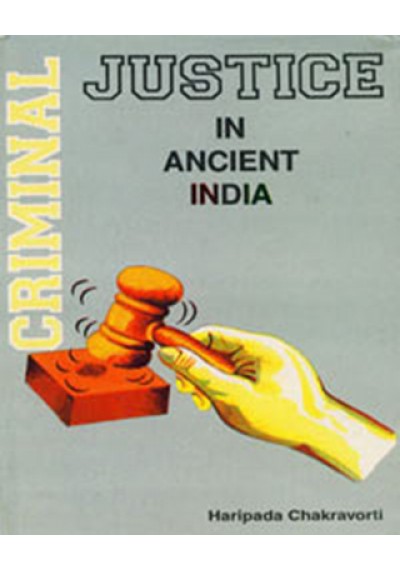PUBLICATION DETAIL

Criminal Justice in Ancient India
| Author | : Haripada Chakravorty |
| ISBN | :81-85616-21-3 |
| Price | : |
| Size | :23 cm |
| Year | :1996 |
| Format | :Hardbound |
| Description | :290 p. |
| Qty |
About the Book
The richness of Indian culture has left its stamp in all institutions designed by the mind of ancient India, and the judicial system formulated by ancient India is no exception to this general rule. Ancient India employs the term 'Dharma' to signify the concept of law, and this law is comprehensive in character in as much as it brings under its orbit not only the laws of physical science, but also social laws, which the experience, wisdom and intuition of highly developed personalities could discover as unalternable.
Though the body of laws or 'Dharma' was traditional in character and from that point of view could not be altered by direct changes introduced by the State, yet law was continuously being made by the judges through interpretation. The institution of justice depended much on the part played by the jury and the jury was appointed from members of the society having proven character and command over law. All cares were taken to keep the judiciary free from the influence of the monarch and other powers of vested interest.
The procedure of criminal law was equally significant. No one was exempted from punishment and it was also prescribed that if persons of a responsible position and social status and officers in the administration commit an offence they were required to undergo punishment more severe than that meted out to an ordinary citizen committing the same offence.
Though ancient India had stated much about criminal justice and judiciary system, no author has as yet made an attempt to collect all the available materials from ancient Indian texts and give a comprehensive and exhaustive treatment of the system of administration of criminal justice as prevalent in ancient India.
Starting from an analysis of the evolution of law and kingship, as recorded in Ancient Indian smrti texts, the epics and the puranas. Dr. Chakraborty has proceeded to expound the theory that was floated by ancient India- the theory that the king was considered to be the fountain head of justice. A detailed treatment of different stages of trail has found place in this work enhancing its value as a source book. Different types of evidences such as document, witness and conduct has been analysed.
The author has shown how ancient India did formulate a clear-cut definition of ‘Crime’ beginning from defamation and ending with criminal assault and murder and prescribed appropriate punishments for those crimes.
About the Author






